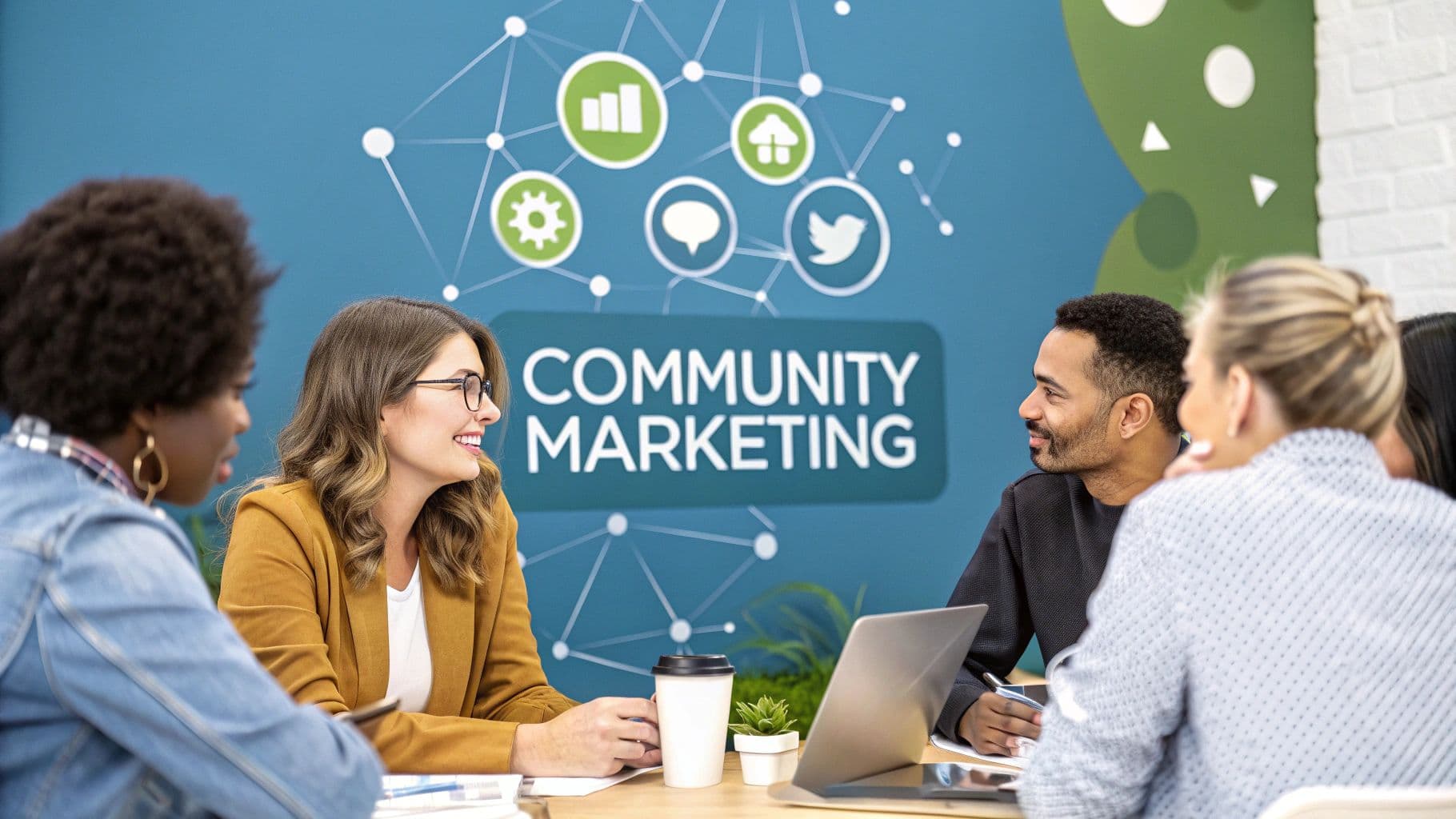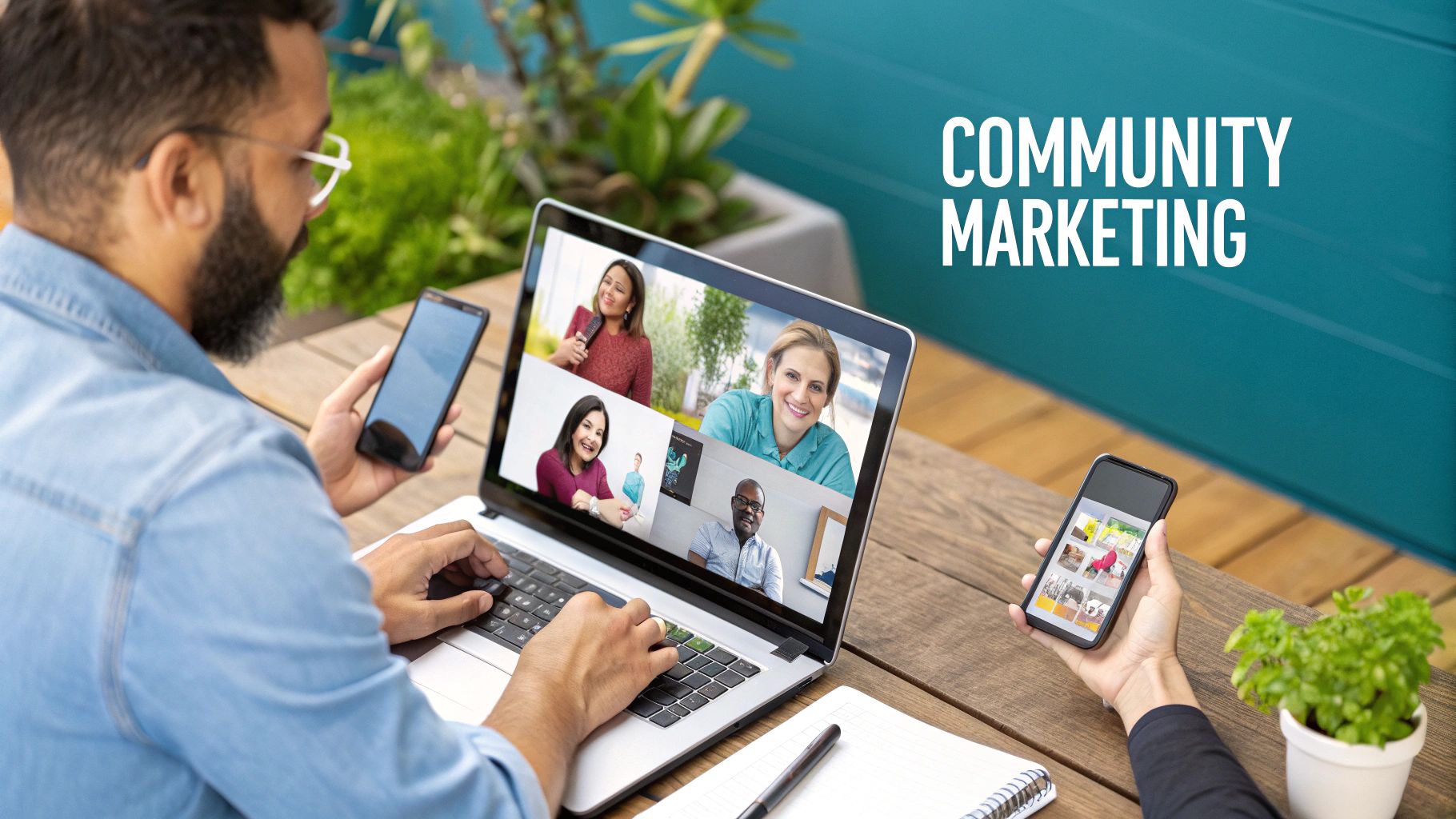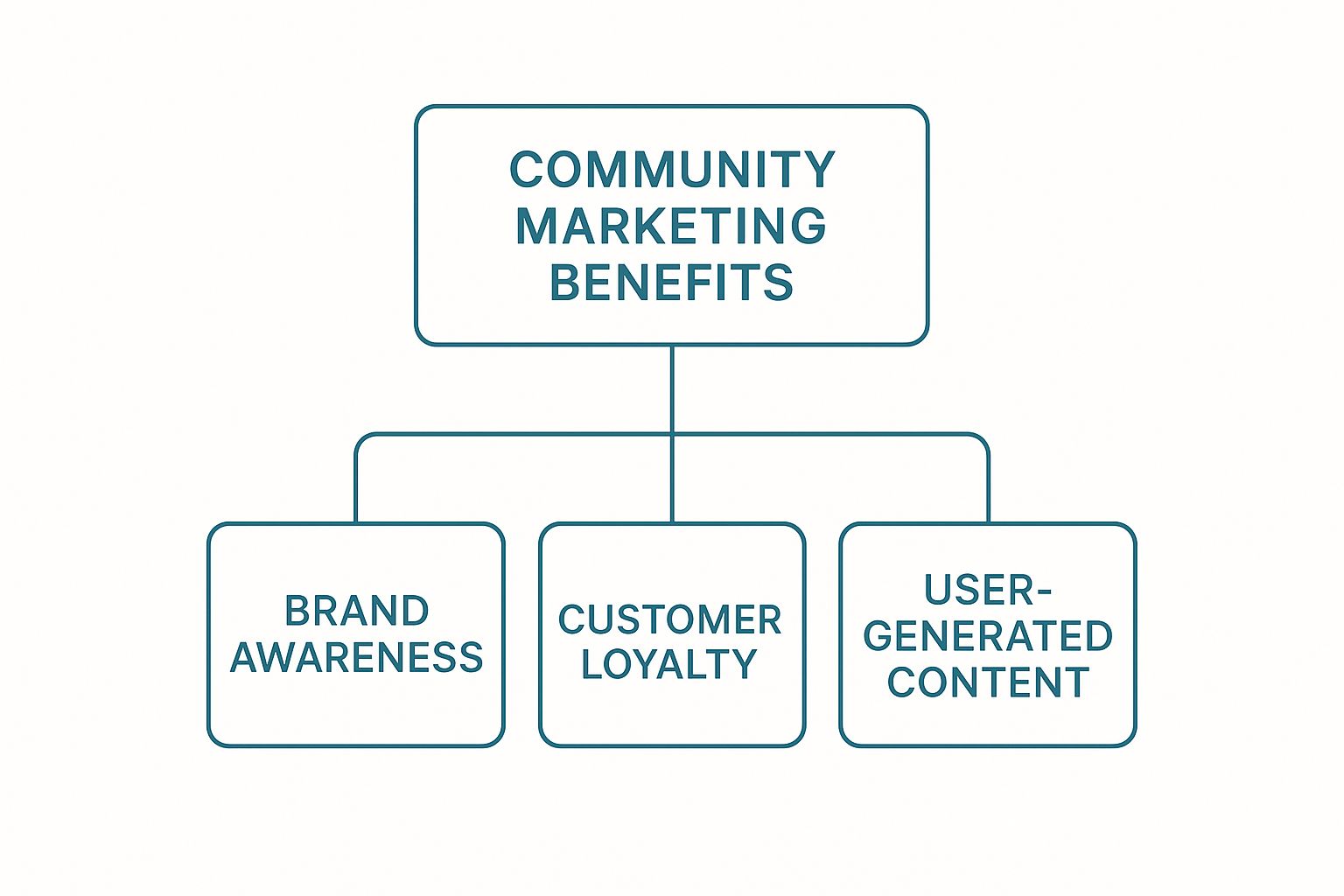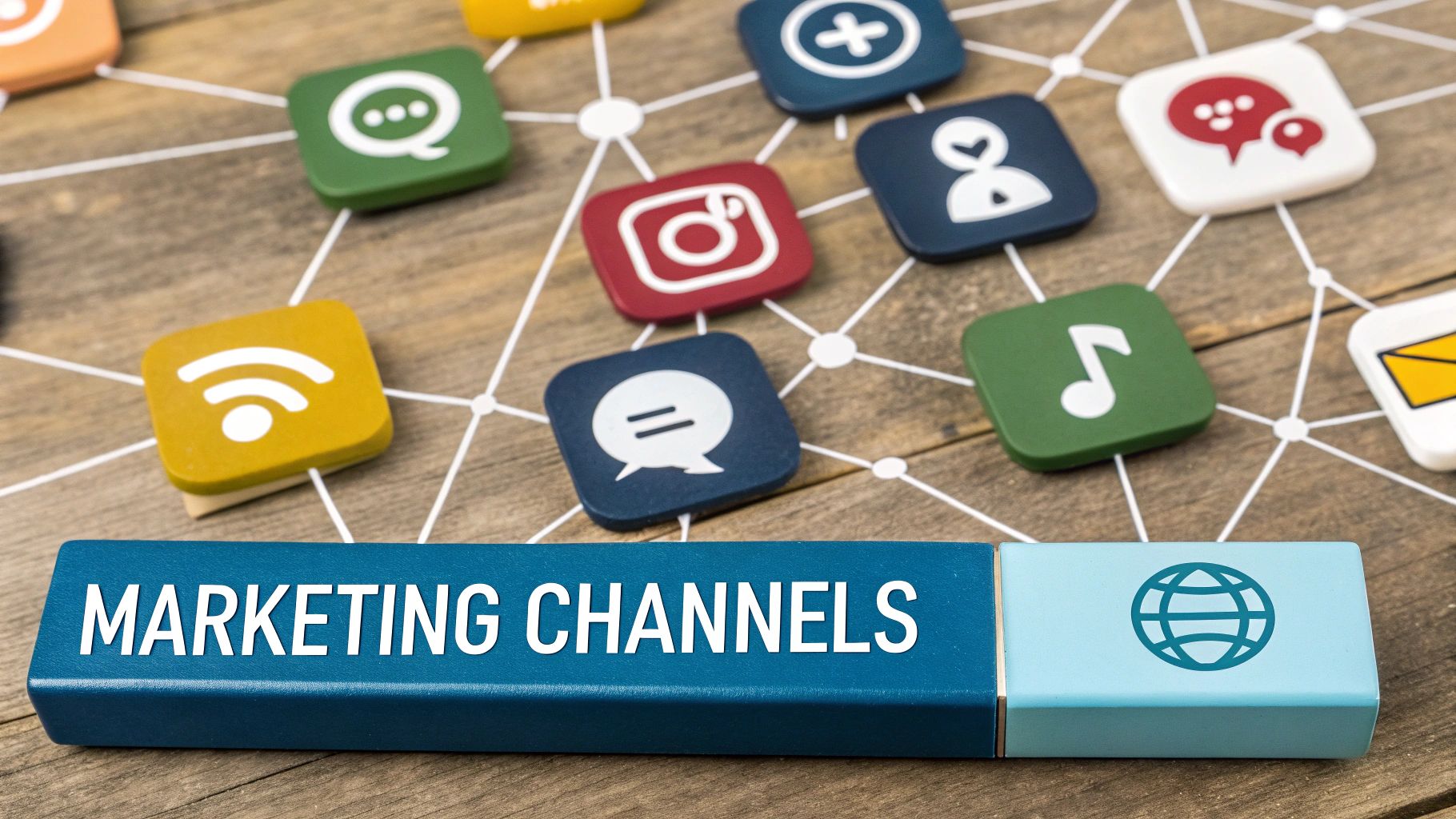
Forget shouting into the void with ads. Let's talk about what actually works. Community marketing isn't about sales pitches or one-way broadcasts. It's about building a space where your users and fans can connect with each other and with you.
As a founder, I see it as turning a megaphone into a roundtable. Instead of just talking at people, you're building a tribe that doesn't just buy from you—they actively champion your success. This is our playbook.
What Community Marketing Is and Why It Matters

At its core, community marketing is about fostering real relationships. It’s a strategic shift away from the traditional ad noise that, let's be honest, everyone is sick of.
Modern customers are smart. They tune out polished ad campaigns and look for authenticity. By building a community around a shared problem, you create trust and belonging that a billboard never could. This is how you build lasting connections, not just fleeting transactions.
To get a better sense of how this plays out, it helps to see the contrast with older methods.
Community Marketing vs Traditional Marketing
This table breaks down the fundamental differences between the two mindsets.
| Aspect | Traditional Marketing (Megaphone) | Community Marketing (Roundtable) |
|---|---|---|
| Primary Goal | Drive immediate sales and leads. | Build long-term relationships and loyalty. |
| Communication | One-way broadcast from brand to consumer. | Two-way dialogue between members and the brand. |
| Key Metrics | Impressions, clicks, conversion rates. | Engagement, retention, user-generated content, sentiment. |
| Customer Role | Passive audience or target demographic. | Active participant, co-creator, and advocate. |
| Value Focus | Communicating product features and benefits. | Providing member value, support, and connection. |
Seeing it laid out like that makes the difference pretty clear, right? One is a short-term play, the other is a long-term investment in your brand's ecosystem.
Why This Matters for Founders
For anyone building a business from scratch, a strong community isn't a "nice-to-have"—it's a competitive moat.
Why? Because a thriving community gives you direct, unfiltered product feedback. It generates authentic user-generated content. Most importantly, it creates a fiercely loyal customer base that a competitor can't just poach with a 10% discount. This is how you build sustainable growth fueled by people, not just ad spend.
Of course, a community doesn't just run itself. This is where you need a solid grasp of what is community management involves—the daily work of nurturing conversations, supporting members, and keeping the space healthy and engaging.
When you invest in that work, you kickstart a powerful flywheel. Happy customers help each other, share their successes, and naturally attract new people to your brand. That's the magic of true organic growth.
The Pillars of a Community Growth Engine
A powerful community doesn't just appear; it’s engineered. At BillyBuzz, our community marketing engine is built on three core pillars: Listening, Engaging, and Empowering. This isn't theory—it’s the operational blueprint we use every day.
Think of it as a natural progression. First, you listen to find where your expertise is genuinely needed. Then, you engage to add real value, long before you ever think about pitching. Finally, you empower your happiest users and turn them into passionate advocates.
Our 3-Pillar Framework
Pillar 1: Listening
This is your foundation. It's about finding people actively asking for help with a problem you solve. We set up systems to find these "help me" signals. You’re looking for an opportunity to be the hero.Pillar 2: Engaging
Once you find a relevant conversation, your only goal is to be helpful. That's it. Give a thoughtful answer or share a useful resource. You build trust by being the most helpful person in the thread, not the loudest salesperson.Pillar 3: Empowering
After building trust and creating happy users, you build a self-sustaining flywheel. This means giving your biggest fans a stage to share their stories. This creates the kind of authentic social proof that no ad campaign can buy.
This simple, three-part process is designed to drive key benefits for any business, as you can see below.

As the visual shows, a well-executed community strategy directly boosts brand awareness, deepens customer loyalty, and generates a steady stream of authentic, user-generated content.
Community marketing is about building an asset, not just running a campaign. It’s a long-term investment in relationships that yields compounding returns in trust, feedback, and organic growth.
Never underestimate the power of these relationships. Some research even shows that just one engaged community member can generate the equivalent engagement of 234 social media followers. That really underscores the immense value of focusing on deep connections over wide, shallow reach. You can dig into more data on the power of community marketing to see for yourself.
Ultimately, this framework gives you a repeatable process to build that valuable community asset from the ground up.
Our Playbook for Finding Online Conversations

Theory is great, but execution is everything. The "Listening" part isn't a concept—it's a game plan to find people who genuinely need your help. Inside BillyBuzz, we've boiled this down to a repeatable process.
Our strategy is built on setting up smart, context-aware alerts. We don't just track our brand name. We listen for problems. That’s the entire point: show up to help, not just to sell.
Setting Up Your Listening Post
We spend most of our time on Reddit. Why? Because it’s a goldmine of unfiltered conversations. Founders and small business owners are on there every day asking for advice on tools and strategies. We want to be right there when they ask.
For example, a community like r/SaaS is a prime spot. It's packed with founders talking about growth. Posts asking for "tool recommendations" are exactly what we're looking for. These are people actively trying to find a solution we provide.
To find these conversations without scrolling for hours, we use specific keyword alerts. You can get the full rundown in our guide on how to monitor keywords on Reddit, but the core idea is simple: identify relevant subreddits and set up alerts for phrases that signal a need.
The secret to effective listening isn't finding every mention of your brand. It's finding every mention of the problem your brand solves.
This simple shift changes your approach from self-promotion to problem-solving. It gets you into conversations where you can provide immediate, tangible value.
BillyBuzz Reddit Alert Rules: The Exact Filters We Use
Here's a look at our internal cheat sheet for finding high-intent conversations on Reddit. This is how we filter out the fluff.
| Subreddit | Keywords to Monitor | Negative Keywords to Exclude |
|---|---|---|
| r/saas | recommendation, "alternative to", "how do you", "looking for a tool" | free, hiring, internship, job, looking for cofounder |
| r/smallbusiness | "marketing help", "customer feedback", automate, "best software for" | job, resume, "for sale", event, course |
| r/Entrepreneur | "struggling with", "need advice", "growth hack", "user acquisition" | podcast, looking for cofounder, event, hiring, free |
| r/marketing | "tool recommendation", "analytics software", "customer insights", "feedback tool" | career, salary, agency, hire |
This combination of targeted communities, positive keywords, and negative keywords instantly filters out 90% of the noise, leaving a high-signal feed of pure opportunity.
How to Join Conversations Without Being a Spammer
Finding the conversation is half the battle; knowing how to join in is the other. The quickest way to get ignored—or banned—is leading with a hard sell. It’s a rookie mistake.
At BillyBuzz, we live by a simple rule: Help, Don't Sell. Your goal is to give value, full stop. Solve their problem, even if it means your tool isn't the right answer. This selfless approach builds rock-solid trust.
When you consistently show up to help, people notice. That's when you earn the right to mention your solution when it's genuinely the perfect fit.
Our Response Template
We’ve refined a three-part framework for every comment we post. This structure ensures we always add value.
Acknowledge and Validate: Start with empathy. "That's a tough spot to be in," or, "I've been there, it's frustrating," shows you're listening.
Offer a Genuine Solution: Give them a real answer right then and there. This could be a different tool, a specific strategy, or a link to a resource. No strings attached.
Introduce Your Tool (Subtly): Only after you've provided a complete solution, gently introduce your product as another option. For example: "By the way, if you’re ever looking to automate this, we built our tool for exactly that."
Here’s a real response template we use:
Hey [Username], that's a common challenge. A couple of ways you could tackle this:
- [Provide Actionable Tip #1]
- [Provide Actionable Tip #2 or recommend a free tool]
Full disclosure, I'm the founder of BillyBuzz. Our tool was actually built to solve this exact problem by [mention specific feature]. Might be worth a look if you want to automate the process, but the tips above should get you started either way. Good luck!
This approach works because people trust peer recommendations far more than an ad. You can get your content in front of the right people with solid effective content distribution strategies.
Turning Happy Customers Into Brand Advocates
The real magic happens when your happiest customers start doing your marketing for you. This isn't about buying five-star reviews. It’s about building a "growth flywheel" where your most passionate users become your most powerful advocates.
Our approach at BillyBuzz is intentionally low-tech and personal. We actually read the comments. When we spot someone leaving thoughtful feedback on Reddit or giving us a shout-out on social, we notice. It all starts with a simple, non-automated email from me.
Our Advocate Nurturing Process
Once we identify someone who gets what we're doing, we focus on building a real relationship.
Personal Outreach: I send a direct email thanking them for their support. I'll mention their specific comment so they know a real person read it.
Offer Insider Access: We invite them to a private Slack channel for our "power users." This is where we brainstorm, get direct feedback, and give them a sneak peek at what’s next.
Empower, Don't Ask: This is key. We never directly ask for a review or testimonial. Instead, we empower them. We might give them early access to a new feature we know they'll love.
Amplify Their Voice: When they do share their story, we put a spotlight on it. We'll reshare their content, feature their insights on our landing page, and always give them full credit.
The goal is to make your advocates feel seen, heard, and valued. When you treat them like partners, their advocacy becomes a natural byproduct of a strong relationship, not a forced marketing tactic.
This approach builds a core group of true fans who are excited to talk about us without any financial incentive. It’s the most authentic—and powerful—form of marketing you can get. We take their insights seriously, and you can learn more about how we process this feedback in our guide on how AI improves customer feedback integration.
Common Questions About Community Marketing
When founders first explore community marketing, the same questions always pop up. Let's cut the theory and get straight to the practical answers, based on how we built BillyBuzz.
This isn't high-level strategy. It's the real-world clarity you need to get started.
How Much Time Does This Actually Take?
You don't need to be online 24/7. Consistency beats intensity. A dedicated 30 to 60 minutes a day is all you need to get started. Focus your time on conversations where you can genuinely add value.
In the early days, the founder’s touch is irreplaceable. Your passion can't be delegated. Once you get traction, you can think about scaling, but that initial personal investment is the foundation.
How Do You Measure the ROI?
Trying to tie community efforts directly to revenue on day one is a fool's errand. You'll end up doing all the wrong things. Instead, focus on leading indicators:
- Brand Mentions: Are people talking about you without being prompted?
- Referral Traffic: Check your analytics. Are you seeing visits from Reddit, Quora, or niche forums?
- User-Generated Content: Are customers posting screenshots or sharing tips about your product?
The most valuable return you'll get early on isn't sales—it's feedback. The raw, unfiltered insights from real people are worth their weight in gold for building a better product.
Down the road, you'll be able to connect these activities to sign-ups and draw a clearer line to financial ROI.
What's the Biggest Mistake I Could Make?
Hands down, selling too early. Communities are not another ad channel. People are there to connect and learn, not to be sold to. If you treat them like a sales pipeline, you'll get shut down fast.
Your job is to become a trusted, helpful member. Show up, listen, and offer genuine value. Every single time. The sales will come later as a natural byproduct of the trust you’ve built.
Do I Need to Buy Expensive Tools to Start?
Not at all. Your most powerful tool is your own empathy.
- Google Alerts: Monitor your brand and keywords across the web for free.
- Reddit Keyword Monitoring: Use Reddit's own search or free third-party tools.
- Manual Engagement: Just show up and be a helpful human.
Start small and prove the concept. Once you have a working process, then you can consider paid tools to scale.
Ready to stop scrolling and start engaging? BillyBuzz is the AI-powered tool that finds your future customers on Reddit for you. Start your free trial today.
